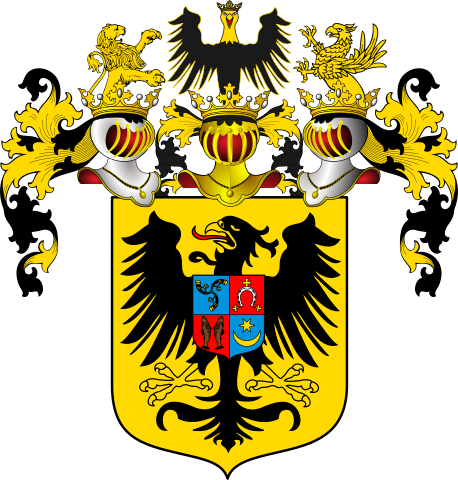It is true, that while Birże Radziwiłłs headed by "Rudy" ("The Red") were richer, the Nieśwież line of his cousin "Czarny" ("The Black") was more influential so long as he lived. It was he, who in 1547 got the whole family the title of Princes of the Holy Roman Empire. By custom, all the ancient princely families descended from Giedymin or Ruryk could use their titles freely, while any other foreign title (count, baron, duke, prince, etc.) given to Polish nobility by foreign powers was frown upon and in time they will be all forbidden. No Polish title of that kind exists beyond the old princes. Radziwiłłs were not among them, but because of their huge influence, they managed to push through and nobody ever questioned their title. Beyond that, huge protectors of Protestantism in Lithuania and with great influence there overall. "Rudy" actually was something of a viceroy of the GDL when king Sigismund II Augustus died. One more thing: his is not the Grand Hetman of Lithuania anymore. The Hetman office became for life in 1581 (all the other offices are for life and cannot be taken away unless high treason is on the agenda) and until that time the king could dismiss him at will. He is the Lithuanian Grand Chancellor and Voivode of Wilno now. Fun fact: being a third son may lead to some funny arguments. "Czarny" could not agree with his younger brother Jan about who inherits what after their father's death. They finally went with the bizarre solution of dividing everything in half: every scrap of land, every building, every outhouse. Luckily for "Czarny", his brother soon passed away and he got everything.
The patriarch Mikołaj died in 1569. Hieronim is the current head of the house. His younger brother, also Mikołaj, lives. The Sieniawski family had the Leliwa coat of arms since times immemorial, much like the Tarnowskis. Remember, that currently you can only adopt commoners, not other nobility. Until 1578 adoption was technically legal, ennoblement by the king as well. Starting with that year both required additionally the Sejm's consent. The same with the indygenat, that is, conferment by the king of the rights of a Polish noble to a foreign noble. These three paths were the only way to earn nobility in the Commonwealth. Naturally, the Sejm wanted to limit this as much as possible in order to stop abusers, like rich burghers and other unworthy individuals from earning nobility, thus starting with 1578 it became harder to be a knight. As for the Sieniawskis, an influential family to be sure, somewhat supportive of Protestantism. Hieronim is currently Castellan of Kamieniec (Podlaskie Voivodeship) and a famous soldier known for his bravery. His brother Mikołaj is the Field Crown Hetman, spending his time in the Ukraine, guarding it against Tatar incursions.
Ok, after some quick research I must admit that I found no Krzysztof. Jan Tworowski was indeed Voivode of Podolia and Field Crown Hetman to boot and did took the heiress of the Buczacki fortune as his wife. His descendants started to use the name of Buczacki-Tworowski because of the prestige associated with it. He had a few sons (eldest Andrzej dies in 1569, no children; Jan dies around 1557, had a son and descendants; Mikołaj lives), but no Krzysztof among them, unless of course he is fictional. Fun fact: Mikołaj, a Calvinist (converted from Catholicism), married in 1570 a daughter of Radziwiłł "Czarny" and is a local Starosta of Bar.
Nice, nothing to add. Jan Firlej was indeed a force of nature for the Protestant cause in the Commonwealth. Great Crown Marshal, Voivode of Kraków, very rich, very influential. Unfortunately he died in 1574. One note, that both Sieniawski and Firlej families were ardent enemies of the Executionists. They and their ancestors benefited from the previous kings' grants and treated them more or less as their private property. Having to lose them (one of the main goals of the movement was to revindicate all the grants of land, etc. that have been illegally retained by the beneficiaries and their descendants so that the Crown may benefit from their return) would be a bad thing for their estates. Thus, they greatly supported the Union of Lublin as a red herring.
[X] Into the princely Lithuanian House of Radziwiłł.
